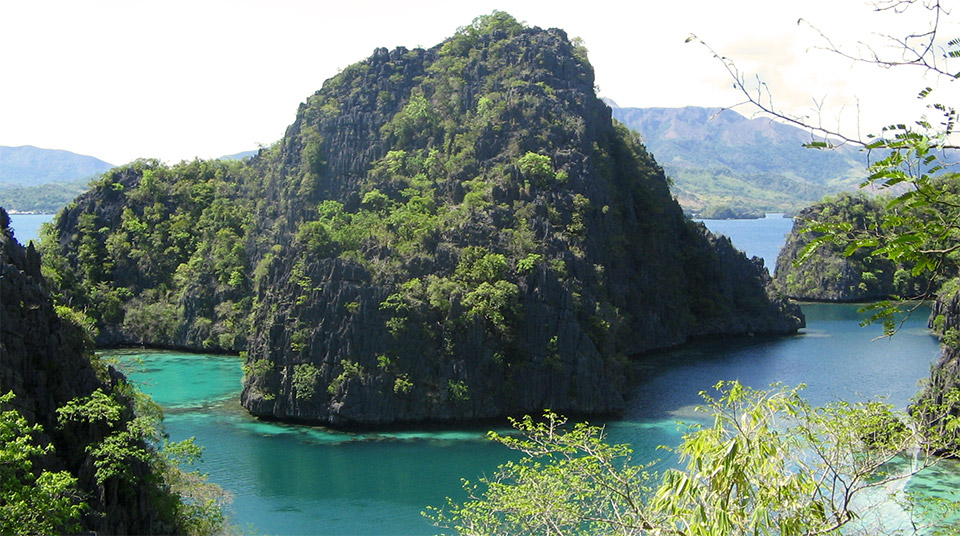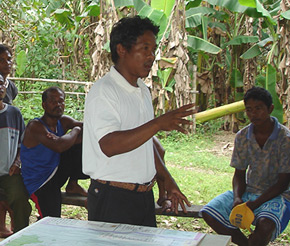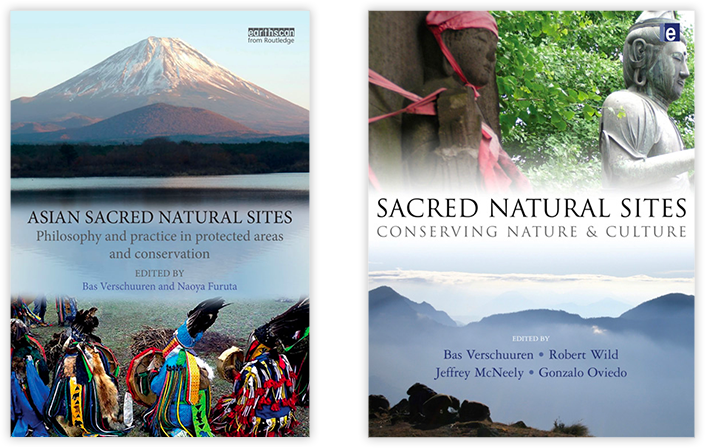Coron Island é unha forma de cuña caliza Illa, situado no lado sur-oriental da illa Busuanga en Filipinas. A maioría da poboación é Calamian Tagbanwa, mentres que os inmigrantes provenientes da rexión de Visayas do país son unha minoría. Este arquipélago ten diferentes tipos de ecosistemas como os arrecifes de coral, seagrass, manguezais, lagoas salobras e bosques de pedra calcaria que soportan unha biodiversidade excepcional, hospedando unha alta taxa de endemismo floral e varias especies de peixes raros, como Blenny (Ecsenius create e Istiblennius Cole) e Dorryback (Labracinus atrofasciatus). Lagos encontradas no ámbito ancestral son considerados sagrados pola Tagbanwa Calamian. É estrictamente prohibido entrar nesas áreas a non ser para fins culturais, como a realización de rituais. Cabugao Lago, o maior lago atopado na illa, é considerado como o centro de espíritos.
Protected on paper but Threatened in reality.
The main threats identified for this area are:
- Unreliable governance agreements,
- Illegal fishing methods and consequent destruction of local coral reefs,
- Illegal logging,
- Conversion of Forests to agricultural fields or sites with different land uses,
- Mining kills a lot of indigenous people, decreasing manpower in protecting the lands and waters,
- Modernization and immigration decrease the belief in and the respect for local spirits.
"The Tagbanwa had secured their land rights not a moment too soon. Coron Island had been named to be incorporated into the National Integrated Protected Areas System. What the Tagbanwa got were promises of majority participation in the protected area’s management board. The Tagbanwa had resisted. Agora, having gained a title of ancestral domain over the island, the Tagbanwa want to maintain their rights to land and decision-making over resources that will affect the future of the island." - Dave de Vera, Executive Director of the Philippine Association For Intercultural Development (PAFID).
Visión
Stronger opposition will be needed to face the prevailing threats. The great challenge among the elders is to revive their strict enforcement of customary rules such as respect for sacred areas. It will need continuous transmission of cultural knowledge and practices, for example in the form of sessions among the youth. Ademais, maintaining the balance with the other stakeholders in the region will challenge the Calamian Tagbanwa to be resilient in the rapid changes they encounter.
Alianza
The Council of Elders, Tagbanwa Tribe Association and the village officials have roles and responsibilities for the ancestral domain to be managed successfully. They are supported by larger scale organizations like the National Integrated Protected Areas Programme, the Phillipine Association for Intercultural Development and the International Indigenous Peoples Centre for Policy Research and Education (TEBTEBBA).
Ferramentas de Conservación
These sacred waters are being conserved through capacity building and strengthening of environmental awareness. Elders are given trainings and knowledge enhancement on national legal matters, para que aprendan a tomar medidas contra os infractores. Mentres tanto, anímase a organizar sesións de transferencia de coñecemento coa mocidade local. Sobre a comprensión ecolóxica, estanse a organizar paseos interpretativos ao longo dun ecosistema de manglares, mentres se exploran opcións para pescar dun xeito máis sostible.
Resultados
Xunto á condición de protexida que esta rexión recibiu en diversas organizacións, Os estudos participativos locais deron resultados de sensibilización e unha maior organización cultural agora axuda a fortalecer a identidade e a integridade cultural..
Custodiantes
Os Calamian Tagbanwa cren que os espíritos habitan nos lagos sagrados. Estes lagos son coñecidos localmente como panyaan. Non todo o mundo está autorizado a ir ás zonas sagradas; a xente ten que ter un propósito definido para ir alí. Anciáns (mamaepet) e xamáns (gratuíto) play a major role in the entrance of a sacred area. They pronounce ulliwatwat, a prayer addressing the spirits to request permission to enter. Next to the ten panyaan that exist there, fish sanctuaries are considered restricted areas, where it is forbidden to fish, drop anchors, or to culture seaweeds. They believe that there is a kunlalabyut or giant octopus living in the area. Cultural knowledge about such phenomena is passed down from elders to the younger generations through oral tradition.
Acción
En 1967, Coron Island was first declared as a National Reserve, then later in 1978 as a Tourist Zone and Marine Reserve and finaly it was granted a Community Stewardship Agreement in 1990. En 1992, Coron Island was included in the priority protected areas under the National Integrated Protected Areas Programme and the strategic Environmental Plan. En 1993, it was provided awarding of the Certificate of Ancestral Domain Claim. En 1998, the struggle of the Calamian Tagbanwa to be recognized was over, Coron Island was granted its ancestral domain claim by the Department of Environment and Natural Resources.
Política e Dereito
With the passing of the Indigenous Peoples Rights Act in 1997, the indigenous peoples in the country now have a support system that can protect their rights over their ancestral domain. By heritage of the ancestors, they now possess the lands, and rule over them with long established laws. But customary laws are unofficial, and elders note that few are being followed. The main problem is that there is no common vision for protecting the cultural heritage: the violator has the option to undergo the Calamian Tagbanwa law or the national law.
- Sampang, A. (2010) Towards a sustainable Management and Enchanted Protection of Sacred Marine Areas at pawalan’s Coron Island Ancestral Domain, en; Verschuuren, Salvaxe, McNeely e Oviedo, Sacred Sitios Natural; Conservación da natureza e da Cultura, Terra de dixitalización, Londres.
- On the Calamian Tagbanwa, ver; Ethnologue, Languages of the World at: http://www.ethnologue.com/show_language.asp?code=tbk
- The Philippine Association For Intercultural Development (PAFID) en: http://www.pafid.org.ph/
- The Philippine Association for Intercultural Development and the International Indigenous Peoples Centre for Policy Research and Education (TEBTEBBA): http://tebtebba.org/





